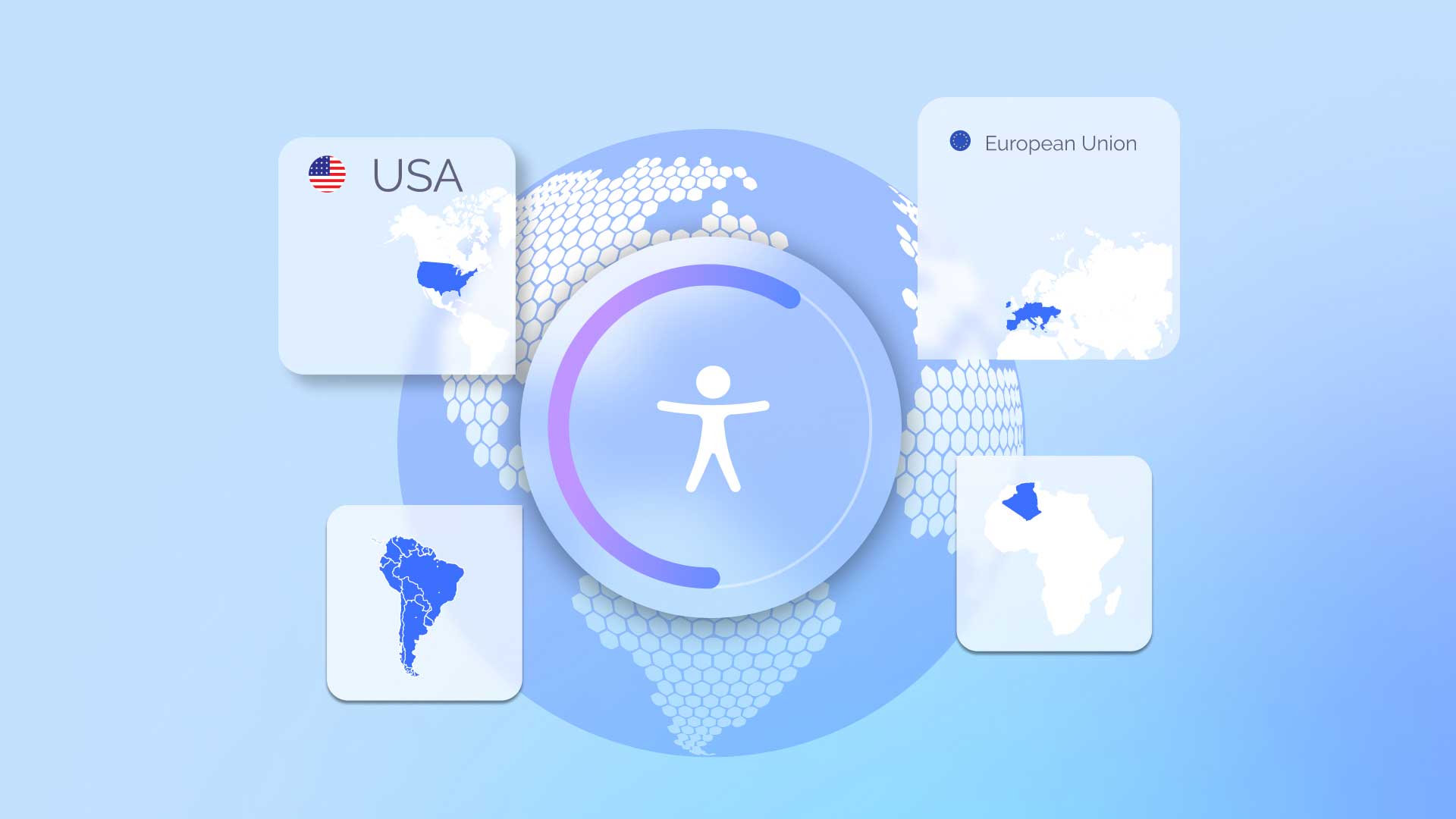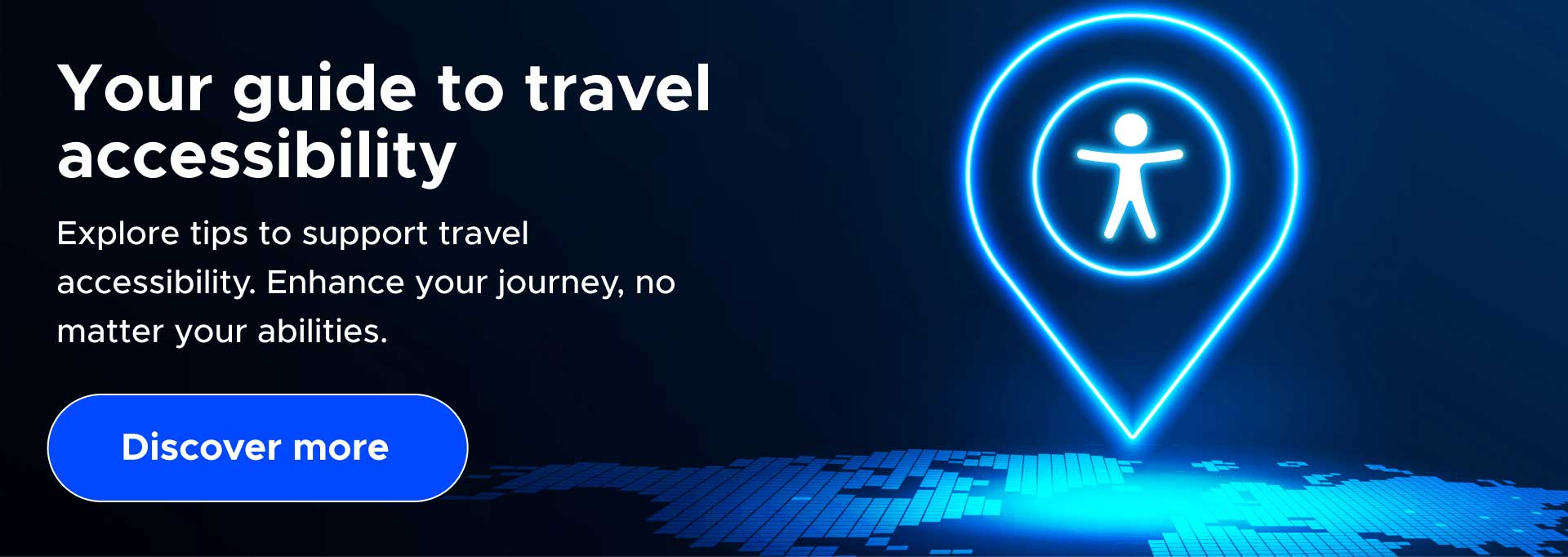Supporting accessible travel: get the facts

Travelers of all backgrounds and abilities have the desire to see and experience the world. From family reunions, to business trips, and exotic vacations, tourism opens a world of culture, food, breathtaking, memorable sites, and experiences to everyone.
Today, the world is taking a turn to give everyone a fair chance to indulge in the world’s travel inspirations and experiences. But some tourism websites, hotels, airlines, planes, and cruise ships need to take a step up to provide more accessibility solutions to people with disabilities.
One survey shows that 96% of 2,700 respondents with disabilities say they’ve experienced accommodation issues—86% with flight problems and 79% with in-market transportation obstacles. While online travel agencies, platforms, and the overall hospitality industry are taking the right steps to empower individuals with a fair playing field for travel booking and tourism as a whole, the industries still have catching up to do.
So, what can we proactively do to make travel and tourism an accessible and exciting experience for tourists of all abilities?
In this blog, we’ll look at how travel accessibility can be life-changing for people with disabilities, examining disability-related tourism trends. And, how those trends are creating an equal opportunity for accessible travel with solutions that open a world of experiences to everyone.
What is accessibility in travel & tourism?
Accessibility in travel and tourism is by definition the inclusive experience of seeing, experiencing, and traveling the world barrier-free. It starts with the fundamental ideal of accommodating people of all abilities from their first steps planning travel, regardless of physical, cognitive, or other disabilities.
Who doesn’t love an excursion, a visit to friends and family, or an adventure solo? All while experiencing trips that can be planned and pursued without obstacles and enjoyed inclusively.
Accessible tourism empowers people to cherish and benefit from their travel, with full consideration of their diverse needs and backgrounds.
And because most people today start their tourism plans online, it’s time for travel websites to embrace and integrate digital accessibility. Keeping up with changing consumer trends can be everything from optimizing UX on laptop and desktop, while creating a responsive online experience that’s inclusive, interacting and simple to navigate on mobile.
Read on to learn why travel accessibility and digital accessibility are a match made in tourism heaven.
Travel for people with disabilities & digital accessibility
Destination websites are typically the first stop on the vacationer’s journey. But limited accessibility can send travelers with disabilities in the wrong direction, quickly steering them off your website due to lack of inclusive UX.
A study found that over 70% of people with disabilities leave inaccessible websites.
One billion people have disabilities, representing the most significant global minority. Yet, with this critical demographic’s formidable spending power and desire and passion for travel, inclusion is yet to be prioritized by online travel agencies and booking platforms.
If your site isn’t accessible, just imagine the revenue you’re leaving on the table, especially considering the following statistics:
- 83% of American adults prefer online booking
- 94% of those who need accessibility info considered it critical
- Nearly 70% are less likely to book if they can’t locate accessibility info
- 70% of people research travel on smartphones
- Roughly 700 million end users will book online through 2023
Travel accessibility at its core starts with industry websites made with information and ideas that are easy to find and understand. Whether a tourist’s exploring destinations, hotels, sites to see, or comparing prices, accessibility is key. Accessible tourism and digital experiences are vital, as online content enables people with disabilities to discover and enjoy places and activities that enrich their travel experience.
Plus, disability and travel websites have the potential to earn more and grow with equal online experiences delivered to all and any travelers, whatever their physical or cognitive abilities.
The accessible vacation & tourism markets
What are the costs of inaccessibility to the hospitality industry? Beyond the legal requirements and ethical obligations ensure inclusive online experiences for all travelers, the financial impacts are also notable and worth mentioning:
- American adults with disabilities spend $17 billion on traveling annually
- People with mobility impairments spend nearly $60 billion annually
- Travel accessibility and accessible tourism in Europe could generate about $100 billion by 2025
- Travelers requiring on-site accessibility at accommodations choose four-plus-star hotels and high-grade airplane seats more often.
Are you planning a business trip or a leisurely vacation? The handy tips below help make travel for people with disabilities a positive, inclusive, memorable, and enjoyable experience.
Accessible Travel Solutions: Five Helpful Tips
1. Reserve mobility/transport devices for an accessible vacation
You’ll need constant access to this equipment, so it’s best to set it up beforehand. Make sure that your comfort and anyone with a disability and travel on the horizon can enjoy every minute of the experience. You never want to pass up experiences just because a walker, wheelchair, or any mobility or transport device is out of reach. Inclusion is all about making sure that anyone can enjoy the perks of accessible tourism, and getting around in comfort is critical.
2. Contact airlines & hotels: accessible tourism can be accommodated
Reach out to airlines, hotels, and any service provider to make sure accommodations and travel accessibility needs are everyone’s priority.. That way, you can maximize the adventure’s exciting experiences, and make others and yourself aware of potential obstacles that can be overcome.
Hotels can help ensure an accessible vacation with the type of room, bed, and mobility you require. And airlines can look into making your flight and travel everything from wheelchair accessible, to getting to restrooms with ease, and enjoying a peaceful, pleasant journey with assistance if required.
3. Disability & travel with a pet and/or service animal: know guidelines
In certain circumstances, our pets and animal friends can become a huge asset to our accessibility and inclusion in our daily experiences. Travel is no exception, but it does require documents, vaccines, and verified proof of need to travel with pets. Seeing-eye dogs, for example, not only can make or break the accessible vacation, they could be a life-saving chaperone for travelers with visual impairments or blindness.
Other conditions have been treated and or approved for pet liaisons to drive accessible tourism, like high blood pressure, high heart rate, anxiety, depression, and often our pets simply support our physical and mental well-being. To make sure you and your furry friends have a great trip, reach out to your service providers for transportation and accommodations, and find out how you can make your experience the perfect accessible vacation.
4. Get a transporter or assistance to make accessible tourism easy
Sometimes, all we need is a little help getting into our comfort zone, and empowering individuals with a transporter or assistance can make all the difference. Accessible tourism with supportive transporters or caretakers can help you get around the airport, and airlines provide the service for anyone with disabilities. With fantastic benefits for solo or group travel, accessibility assistants can simplify the little things that make a big difference in your accessible vacation.
5. Use your camera app as a magnifying glass: seeing is accessible travel
Capturing memories on camera is a token of your great travel experience. But the camera app on smartphones has an even more practical application for vision impairments too. Can’t see crucial airport signage or it’s difficult to read from a distance? Take out that smartphone, open the camera app, and zoom in before you take the shot. Then make sure you know where to go, and how to make the route there accessible and simple. Or, just enlarge the text on your screen after you take a pic.
Accessibility in travel & tourism: the future of the industry
Travelers with disabilities can face obstacles booking, verifying, and even ensuring their experience is inclusive before arriving or traveling. Online digital barriers are most prevalent on reservation and agency websites. While on-site hurdles pop up more when it comes to lodging and transportation, two critical parts of anyone’s travel.
But we should all be encouraged to know that accessible travel is shifting and moving into the right direction. Whether it’s experiencing sites and activities in an accessible museum, or enjoying amusement parks with disability access in enchanting places like Disney World, inclusivity enhances travel. And it makes disability and travel experiences easier, more pleasurable, and supports an accessible vacation and memory for people of all abilities.
Even though there may be an uphill climb for the accessible tourism experience to extend to people worldwide, some organizations in the travel industry can and do lead by example. Adopting the right inclusive tech and accessibility solutions to start booking and reservations out right online is a step in the right direction. Not only does your travel and tourism website meet ADA compliance requirements, it amplifies UX and extends a more smooth and simple booking experience to everyone.
Discover why UserWay’s accessibility solutions are the preferred technology to conform to compliance, selected and installed by millions of organizations worldwide.
UserWay: Digital Accessibility for All Industries
Website owner? Creating digital experiences to give online users an unforgettable way to engage with your offer. You need an accessible website. And the bonus is it will increase SEO rank, extend reach and target audience, and accommodate people of all abilities. While accessibility and ADA compliance are also legal obligations, fostering inclusive UX online bodes well for any brand. UserWay can help.
UserWay’s AI-powered accessibility solutions can help companies of every background provide and conform to digital inclusion standards. Plus, you reap all the benefits and bonuses of more revenue, a great stance of leadership with innovation driving advocacy for human and disability rights, and ultimately – you’re given everyone a fair chance to enjoy your online offering fully.
Ready to take your travel or hospitality website to next level inclusion with accessible digital experiences?
Talk to an expert & get started with UserWay today.
Answers to Common FAQs
How does accessibility in travel & tourism benefit everyone?
Simple: we all deserve the right to travel and tour the world without hassles. Making adjustments to physical locations can help accommodate the needs that come with disability and travel. But websites, and digital experiences are no exception. So when booking travel experiences and then touring in person, prioritizing inclusion can open a world of opportunity to people with disabilities and diverse backgrounds and provide an accessible vacation.
What are digital accessibility requirements & why do they matter when it comes to disability & travel?
Digital accessibility removes obstacles that deter engagement or access to websites, digital devices, and third-party assistive technologies. ADA compliance online is critical to any industry. But accessibility in travel & tourism can especially help travelers with disabilities start their journey out right. Websites providing more seamless online experiences in the industry will see a broader reach of their offering. And booking and reservation platforms create a simpler, faster, and more enjoyable experience for anyone in need of travel accessibility accommodations before they even reach their destination.





Share